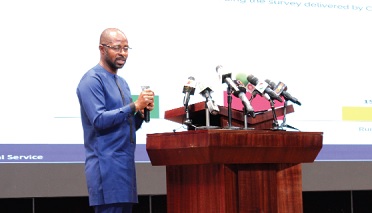The 2022 Ghana Demographic and Health Survey (GDHS) report has established that 98 per cent of women aged 15 to 49 receive antenatal care in Ghana, a percentage the Ghana Health Service (GHS) has described as very good.
The report also showed that 86 per cent of births delivered were in a health facility, that geographical space where they had access to interventions to save their lives.
Furthermore, 87 per cent of women and 87 per cent of newborns were identified by the report to have had post natal checks.
The Deputy Director, Reproductive and Child Health (RCH) of the GHS, Dr Chris Opoku Fofie, who made this known at the dissemination of the 2022 GDHS report on maternal and child health and malaria, described the percentage of women and newborns that had post natal checks as low and, therefore, called for an improvement.
He further disclosed that the report identified that 18 per cent of women were examined by healthcare providers for breast cancer while five per cent were examined for cervical cancer, a percentage, he also described as low and unacceptable and called for an improvement.
The 2022 GDHS data was obtained from a nationally representative sample of 18,540 households distributed across all 16 administrative regions and 261 districts of the country.
The survey conducted interviews with 17,933 households; 15,014 women, aged 15 to 49 years, and 7,044 men, aged 15 to 59 years.
Accessing health care
Regarding challenges in accessing health care, Dr Fofie said 54 per cent of women reported that they had at least one challenge in accessing health care, highlighting some of those challenges to be money for treatment, obtaining permission from employers to access health care and distance to health facilities.
He pointed out that from the report, 45 per cent of women had the challenge of getting money for treatment, 10 per cent had challenges getting permission to access health care while 22 per cent reported that they had issues to do with distance to health facilities, either the distance was too far or the roads were unmotorable.
Throwing more light on distance to health facilities, Dr Fofie said about 30 per cent of women had to travel between 30 and 59 minutes to be able to get to health facilities while 58 per cent were able to access health facilities in less than 30 minutes which is the global target.
“If women are able to go to antenatal and deliver safely, we have to congratulate them because at any given time there are challenges that are preventing them from accessing care.
If we get a good number of pregnant women accessing health facilities in less than 30 minutes, there is a likelihood that whatever emergency situation that may occur, they will be able to get there alive and be supported to survive,” he explained.
Men’s involvement in maternal health care
The Deputy Director of RCH said the report also highlighted men’s involvement in maternal health care which he explained was known to be an intervention that helped in maternal health care.
He said from the report, 95 per cent of men reported that their child’s mother had antenatal care during pregnancy, 52 per cent were present at antenatal with their wives and 66 per cent went with their child’s mother to a health facility during delivery.
While commending the men for their involvement in maternal health care, he encouraged all men to accompany their partners when it was time for delivery.

